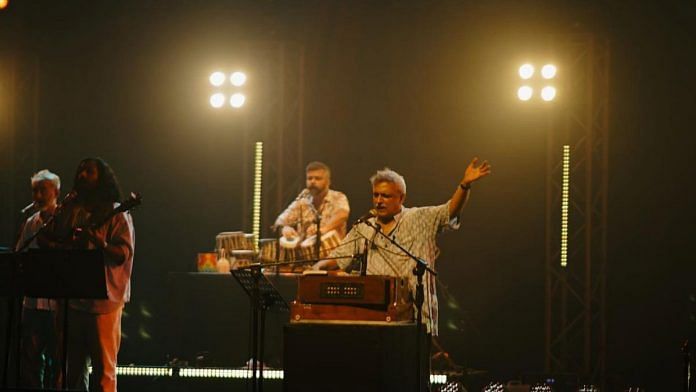New Delhi: Is Piyush Mishra a BJP leader/candidate? Type his name into Google and the search engine prompts this question, indicating the new spike in interest about his political affiliation, or shall we say somersault. Of late, his political ideology, and his disenchantment with Communism has filled online conversations. But that’s not what the 60-year-old multipotentialite is obsessing over these days. For the past seven years, since all the political speculation began, he has been touring India with his “lyrics-oriented” band Ballimaaraan.
“For those who are feeling let down by assuming that I support BJP are stupid. I like Narendra Modi, as a politician and prime minister. I see Chanakya in him,” he says, dismissing any will or possibility of working with the Bharatiya Janata Party or politics.
Songwriting remains to be on the forefront of the actor, singer, lyricist, playwright, screenwriter, and musician’s enduring legacy. His lyrics are frequently political, often playful, but mostly sprinkled with a touch of sadness. Ever since Aarambh Hai Prachand from Anurag Kashyap’s Gulaal (2009) became an anthem of sorts for anger, aspiration and anxiety-filled public meetings, including at BJP rallies in 2014, his music journey has preceded everything else. Recently, during the band’s performance at the 1,865-seater Siri Fort during the Delhi Theatre Festival got a standing ovation and the audience demanded an encore. Mishra, who described Delhi as “home”, obliged and sang Aarambh Hai Prachand again. As the veteran artist created magic on stage, the crowd was lit up with flashes from phone cameras swaying to the rhythm.
The blockbuster song still remains one of the most requested songs during his band’s concerts. He’s collaborated with Coke Studio on songs Husna and Ghar, both of which have millions of views on YouTube and receive thunderous applause each time they are performed as part of live shows.
“I had written most of the songs [performed during concerts] in the early 90s. They were rejected by the film industry, and now see, they are doing well today,” he says, speaking about songs like Wo Purane Din and Dabi Chawanni
Earlier this year, he added another feather to his already decorated cap. He turned author with his autobiography Tumhari Aukat Kya Hai which touches upon his struggles, and successes.
Also read: Pakistani singer Zeb Bangash is making classical music less intimidating–with ‘Healing Khayal’
‘Revolutionary artist’
Across different projects Mishra anchored, revolution has been at the forefront.
From political factionalism in Aabroo in Gangs of Wasseypur 2 (2012) to neoliberalism in Uth Ja Bhau or memories of Partition in Husna, Mishra does not shy away from being vocal about his politics or ideologies.
“Be it our views on sex or climate change, we sing about everything,” he says while speaking about his band prior to the beginning of their tour, Aarambh, slated to hit 25 to 30 cities across India.
He has never been one to shy away from speaking openly about issues, especially his ideology.
“At the core of it, he is an anti-establishment type of artist. What he did in theatre in the 90s and 2000s, [what] he is now doing in the film industry,” says filmmaker Imtiaz Ali, who has collaborated with Mishra during his theatre days and in films like Rockstar and Tamasha.
It is difficult to decode what makes Mishra unique. Most of the magic, his colleagues say, happens in a fraction of minutes, oblivious to the naked eye.
“During the making of the song Bandeh [from Black Friday], we played some tune and he [Mishra] asked us to wait and went out on the balcony. Within minutes, he returned with the lyrics of the song,” says Indian Ocean’s Rahul Ram, who described Mishra as “mad” in a “delicious, glorious way”.
“I wish I could write like him. I wish I could create magic like him. I wish I could sing like him,” says actor Jimmy Shergill, who worked with Mishra in films like Happy Bhag Jayegi (2016) and Happy Phirr Bhag Jayegi (2018).
Mishra’s brazenness does not always sit well with others, including his friends. But the difference in ideology rarely affects his equations with longtime friends, particularly Anurag Kashyap. The two have worked together on several projects including Gulaal and both parts of Gangs of Wasseypur, and are collaborating on Kashyap’s upcoming project.
“We are not aligned together in any possible way, be it politics, ethics, or the way he makes films. I only talk to him when there is a need. But there is love deep down which brings us back together, again and again,” says Mishra. It’s the same for Kashyap.
Also read: When a Rafi-Lata showdown left Bollywood music composers out of choice
Theatre and Delhi — two great loves
After over 70 song credits (as a lyricist, composer, and singer), and acting in around 50 feature films, a dozen of web series, and numerous stage appearances, Mishra’s heart lies in Delhi and its theatre.
His “lyrics-oriented” band was created in 2016 and named Ballimaaran, after Urdu poet Mirza Ghalib’s residence, because he wanted to remember Delhi through his work.
“We were pondering over the name ‘Inquilab’ for the band. But what can be better than Ghalib when remembering Delhi,” he says.
While he spent two decades doing what he loved the most, he advises aspiring theatre actors against it.
“It is not sustainable to just be a theatre actor. It never was, nor is it today. I don’t know how I did that. But I lost a lot in the process,” he says. However, he also feels that the “scientific approach to acting” as was alive in his contemporaries at the time like Irrfan Khan, Alok Chatterjee, and Manoj Bajpayee, is missing in today’s generation.
“Saans lena dubhar ho jaya karta tha agar acting nahi karte the (It used to be impossible to breathe if we didn’t act),” he says, reminiscing the good old days.
(Edited by Theres Sudeep)



